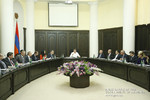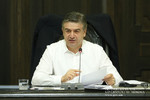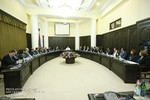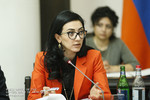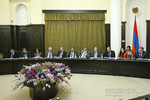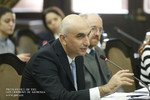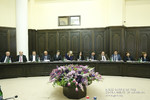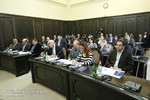Saturday, 21 January 2017
Karen Karapetyan Chairs Anticorruption Council Meeting
Prime Minister Karen Karapetyan chaired a meeting of the Anticorruption Council, attended by civil society representatives. The first item on the agenda referred to the reduction of administrative corruption in the provision of public services.
Armenian Lawyers Association NGO President Karen Zadoyan suggested re-launching the network of anticorruption centers in Armenia, noting that 11 such centers as supported by the USAID used to be operational in our country in the period from 2011 through 2014. They are supposed to provide administrative tools for the prevention of corruption.
Karen Zadoyan noted that the anticorruption centers must adopt a three-dimensional approach: provide legal assistance to victims of corruption, monitor the procedures and legislative acts, submit proposals for reform and raise public awareness. He said that the practice has shown that the anticorruption centers were an effective tool for fighting against corruption. There are many successful examples. In the period 2011-2014, over 17 thousand beneficiaries applied to these centers with administrative complaints and corruption risks amounted to more than two thousand cases. The program will be co-financed by the Government and donor organizations.
Prime Minister Karapetyan stressed the need to involve civil society in the fight against corruption, provide feedback and increase public control. Karen Karapetyan instructed Minister-Chief of Government Staff David Haroutunyan to initiate a topical discussion with the relevant government departments.
Karen Zadoyan also dwelt on the protection of the rights of those individuals (switchmen) providing information on corruption crimes, noting that there are two approaches to this end.
First, switchmen’s rights are protected under the current legislation, by providing security guarantees, and secondly, it is proposed to establish an electronic platform through which it will be able to receive anonymous complaints. The second approach is based on the international experience and legislative acts are now being developed aimed at ensuring the safety of anonymous switchmen. It was also proposed to consider the possibility of establishing incentives for those switchmen providing feedback on corruption crimes.
Justice Minister Arpine Hovhannisyan noted that their approach is being discussed with the two models mentioned above: the anonymous warning ideology as seen in the light of proposal for establishing an electronic platform. In addition, the draft envisages the possibility of giving retroactive questions to switchmen, guaranteeing the anonymity principle. The Minister stressed that the draft will be put up for broad discussion.
“The heralds of corruption have an important role to play in the prevention and detection of corruption,” the Prime Minister said urging the Minister of Justice and the Minister-Chief of Government Staff to take steps in order to introduce the necessary mechanisms for the protection of switchmen’s rights, building a platform for anonymous warning, including the submission to the Government of a bill on the protection of switchmen’s rights as soon as possible.
Executive Director of Transparency International Anti-corruption Center NGO Sona Ayvazyan reported the problems related to the public service in the field of conflict of interests and property and the declaration of income, which bore on the definition of the term conflict of interest, the scope of public officials liable to submit income statement, the regulations, the conflict of interests in the activities of supervisory structures, the existing gaps and so on.
Justice Minister Arpine Hovhannisyan noted that legislative packages are currently being developed or are already in circulation aimed at solving the mentioned problems. The main changes will be introduced in the near future.
“It is clear that from both the legislative and practical point of view, there are many gaps in these areas. Based on this, I am instructing the Minister of Justice to submit a legislative package aimed at streamlining the conflict of interest for public servants and expanding the list of officials liable to income statement,” Karen Karapetyan said.
Then the Council discussed a series of recommendations on systemic anticorruption reforms in the field of business activities. They were related to the introduction of the institute of Ombudsman of business interests, the conduct of probes with regard to public officials dealing with the business sector, the application of sanctions, the use of targeted business sectors policies realization of public servants, public servants for legislation important indices for measuring the results of the work done by their the development and introduction of a bonus based on their salaries, tax and customs declarations representation of workers in the fields and so on.
“We are eager to provide a fair and transparent business environment and, in that respect, the proposals voiced today are important to us,’' the Prime Minister emphasized and ordered the Ministers of Justice and Economic Development and Investment to discuss the proposals with the private sector and present solutions. The Head of Government highlighted the idea of introducing the institute of ombudsman and the business activities carried out in this direction.
Executive Director of the Office of Open Society Foundations Larisa Minasyan reported back the findings of a survey referred to as “Combating corruption and introducing a culture of integrity in Armenia’s educational system.” She noted that an attempt has been made to identify systemic threats to education and submit recommendations for their solution.
Several proposals were made following a keen debate on the aforementioned issues. The Prime Minister noted that the educational system is in for a sizeable package of reforms, which seek to outline different ways of solving problems. “We are facing a lot of problems with schools. We have a surplus of square meters per student, bad living conditions, a surplus of teachers and understaffed schools.”
In conclusion, Prime Minister Karen Karapetyan instructed the Minister of Education and Science to explore the problems raised in the report, discuss them with stakeholders and submit proposals regarding the Ministry’s priorities in the form of specific measures and legislative amendments.







